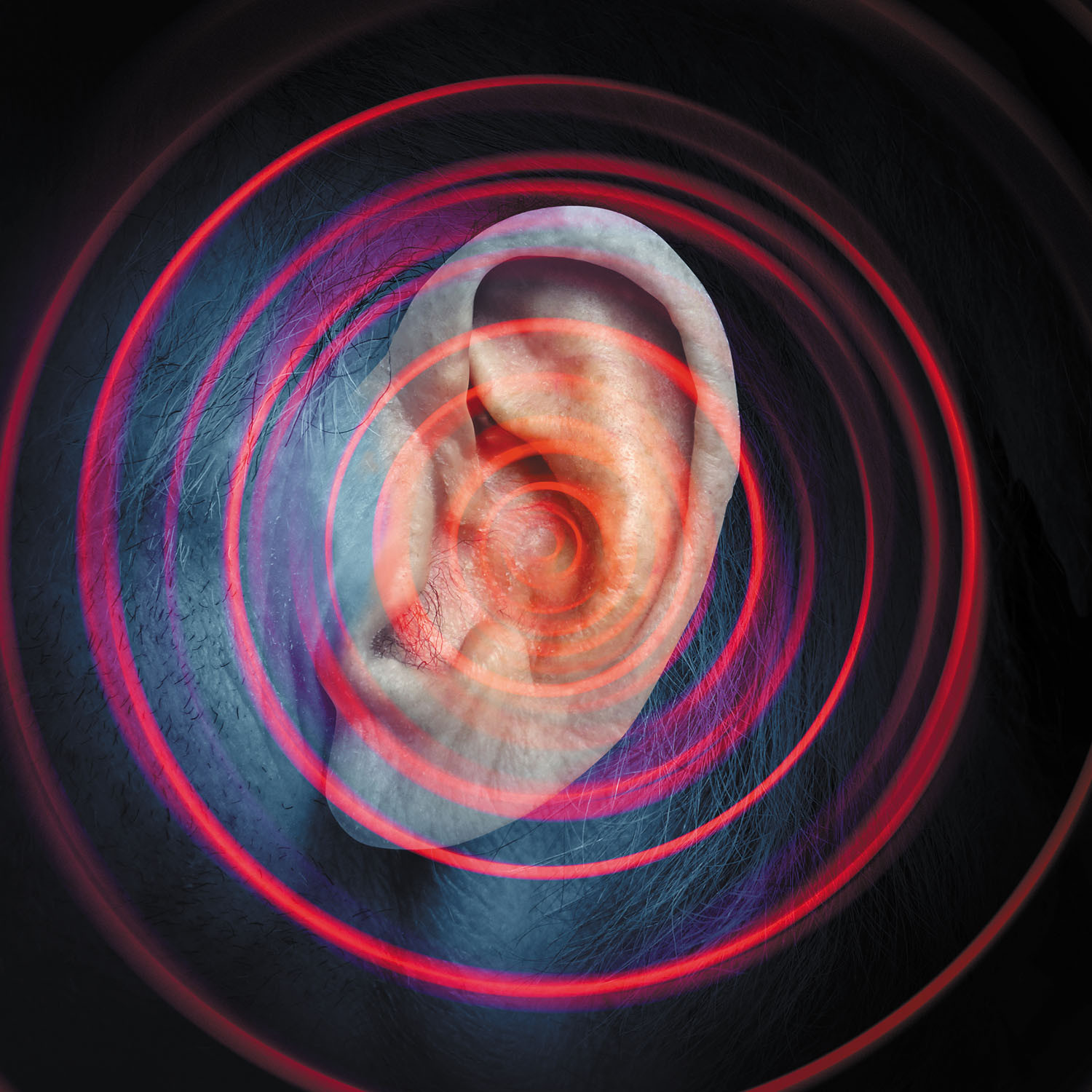Lowering the volume of tinnitus
Ringing or humming in your ears? Sound therapy may help.
- Reviewed by Howard E. LeWine, MD, Chief Medical Editor, Harvard Health Publishing; Editorial Advisory Board Member, Harvard Health Publishing

That recurring sound only you can hear? It's not all in your head. Well, not exactly. You may be one of the estimated 15% of Americans who suffer from tinnitus, a mysterious condition that causes a sound in the head with no external source.
For many, it's a high-pitched ringing, while for others, it sounds like whistling, whooshing, buzzing, chirping, hissing, humming, roaring, or even shrieking. The sound may affect one ear or both, and could feel like it comes from inside the head or from a distance. It may be constant or intermittent, steady or pulsating.
"While there presently is no cure for tinnitus, there are many ways people can manage it so the symptoms do not disrupt their daily lives," says Emma R. Alscher, an audiologist with Harvard-affiliated Massachusetts Eye and Ear.
Possible causes
Tinnitus commonly begins in older age and has a close association with hearing loss. It may also occur after long-term exposure to loud noises, a middle ear infection or tumor, or something as simple as earwax buildup
"If you notice any tinnitus symptoms, see your doctor or an audiologist or otolaryngologist [ear, nose, and throat specialist, or ENT]," says Alscher.
It's unclear what happens in the brain to create the noises. One explanation is that the auditory nerve (which connects the ear to the brain) begins to fray, diminishing normal sounds, according to Daniel Polley, director of the Lauer Tinnitus Research Center at Massachusetts Eye and Ear. Neurons in the brain's auditory processing center compensate for this loss by becoming more sensitive.
"The sensitivity knobs get turned up so high that neurons begin to respond to the activity of other nearby neurons, which creates the perception of a sound that does not exist," says Polley. "The result is a feedback loop, similar to the squeal of a microphone held too close to a speaker." Tinnitus can be associated with other problems as well. For example:
Musculoskeletal factors. Tooth grinding, jaw clenching, or muscle tension in the neck often make tinnitus more noticeable.
Underlying health conditions. You may be able to reduce the impact of tinnitus by treating conditions like depression, anxiety, and insomnia. Tinnitus also can be a symptom of M'nière's disease, a disorder of the balance mechanism in the inner ear.
Medication. Tinnitus can be a side effect of some medications, such as aspirin and other nonsteroidal anti-inflammatory drugs and certain antidepressants — especially at higher doses. The problem often goes away when the drug is reduced or discontinued.
Train your brain
Tinnitus may grow less noticeable over time. Meanwhile, there are ways to tune out or turn down the noise to help minimize its impact (see "Masking the noise").
There are several therapies used for managing tinnitus, including counseling and cognitive behavioral therapy. A successful method for many people is sound therapy, which employs a process called habituation to retrain how the brain responds to tinnitus noise. Working with an audiology specialist, you listen to different noises for specific time frames (how long varies per person). Eventually, the brain learns to change its perception of each noise and treat it as something unimportant.
Most sound therapy treatments involve multiple therapy sessions. The number of sessions varies, and the overall time frame typically ranges from six to 24 months.
Still, sound therapy is a trial-and-error approach that works for some people but not others. "Also, while many people find that sound therapy can provide relief, there is no conclusive evidence it can permanently reduce or eliminate tinnitus," says Alscher.
Masking the noiseAnother approach to taming tinnitus is masking, which uses external noise to alter your perception or reaction to tinnitus. You listen to soothing background noise like white noise, nature sounds, or ambient sounds to help distract your attention from the tinnitus. Many people use devices like sound machines or special headphones to generate masking noise. Alternatively, you could try a household item like an electric fan, a radio, or a TV. If you wear hearing aids, you can use those for masking by turning up the volume on outside noises. An audiologist can help you find the proper background sounds and volumes for masking that works best for you. |
Image: © wildpixel/Getty Images
About the Author

Matthew Solan, Executive Editor, Harvard Men's Health Watch
About the Reviewer

Howard E. LeWine, MD, Chief Medical Editor, Harvard Health Publishing; Editorial Advisory Board Member, Harvard Health Publishing
Disclaimer:
As a service to our readers, Harvard Health Publishing provides access to our library of archived content. Please note the date of last review or update on all articles.
No content on this site, regardless of date, should ever be used as a substitute for direct medical advice from your doctor or other qualified clinician.
















